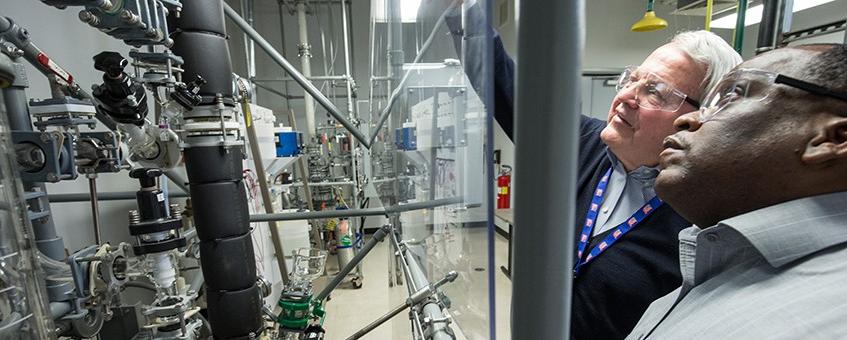
Chemical Process Operator
Associate Degree Program
The Chemical Process Operator curriculum will prepare you for industrial plant employment in the chemical, petroleum refining, polymer and pharmaceutical industries. Laboratory facilities include high tech mechanical equipment, modern instrument trainers, and five pilot plant units.
Offered at the following campus(es): Stanton
What You Can Do
In this program, you will gain the knowledge and skills to prepare you for employment as a process operator in the following industries:
- Chemical
- Oil Refining
- Pharmaceutical
- Polymer
- Utilities
- Power Generation and Alternative Energy
- Water Treatment
- Food and Beverage
What You Will Learn
Program Graduate Competencies
The Program Graduate Competencies listed below identify the major learning goals related to your specific program of study and identify the knowledge and skills you will have when you graduate to be successful in your chosen field.
- Maintain safety, health, and environmental standards during simulation exercises or in a chemical plant.
- Handle, store, and transport chemical materials according to all applicable federal, state, and local regulations.
- Apply chemical process and quality systems in a simulated chemical process environment or a chemical plant.
- Operate, monitor, control, and troubleshoot batch and continuous chemical processes.
- Analyze samples of raw materials, intermediates, and finished products in a simulated chemical process environment or a chemical plant.
- Perform routine, predictive, and preventive maintenance and service to process equipment and instrumentation.
- Use computers or computerized equipment for communications and chemical process control.
Core Curriculum Competencies
The Core Curriculum Competencies listed below identify what you will be able to do as a graduate, regardless of your program of study. You will acquire these core competencies through general education courses and program-specific coursework. You will be expected to use relevant technology to achieve these outcomes:
- Apply clear and effective communication skills.
- Use critical thinking to solve problems.
- Collaborate to achieve a common goal.
- Demonstrate professional and ethical conduct.
- Use information literacy for effective vocational and/or academic research.
- Apply quantitative reasoning and/or scientific inquiry to solve practical problems.
Suggested Pathway to Graduation
Semester 1
| Number | Course Title | Credits |
|---|---|---|
| SSC 100 | First Year Seminar | 1 |
| CPO 100 | Introduction to Chemical Process Operator Technician | 3 |
| CPO 135 | Chem Proc Tech-Equipment | 3 |
| CIS 107 | Introduction to Computers/Application | 3 |
| MAT 183 | Reasoning with Functions I | 5 |
| CHM 110 | General Chemistry | 4 |
Semester 2
| Number | Course Title | Credits |
|---|---|---|
| CPO 125 | Safety, Health & Environment | 3 |
| ELC 101 | Introduction to Instrumentation | 3 |
| ENG 101 | Composition I | 3 |
| PHY 111 | Conceptual Physics | 4 |
| CPO 151 | Chemical Process Tech I-Systems | 4 |
Semester 3
| Number | Course Title | Credits |
|---|---|---|
| ENG 102 | Composition II | 3 |
| ELC 270 | Process Instrumentation I | 4 |
| Elective | Social Science Elective | 3 |
| CPO 252 | Chemical Process Tech II-Operations | 4 |
Semester 4
| Number | Course Title | Credits |
|---|---|---|
| CPO 240 | Quality | 3 |
| CPO 253 | Process Troubleshooting | 4 |
| CPO 260 | Work Experience | 4 |
| Elective | Social Science Elective | 3 |
Approved Electives
Select two (2) social science electives.
| Number | Course Title | Credits |
|---|---|---|
| POL 111 | Political Science | 3 |
| PSY 121 | General Psychology | 3 |
| ECO 111 | Macroeconomics | 3 |
| SOC 111 | Sociology | 3 |
To complete program requirements, you must pass the above courses and earn at least 64 credits. The number of courses and credits required for graduation may be more depending on college readiness and the elective courses offered in your program major (if electives are a part of the program).
CPOAASCPO
Alumni | Delivering Excellence, Changing Lives
This program is offered at the Stanton campus.
This program is offered at the Stanton campus.
Lakshmi Cyr
Department Chairperson, Instructional Director
lcyr@poscoop.com
(302) 453-3791
This program is offered at the Stanton campus.

